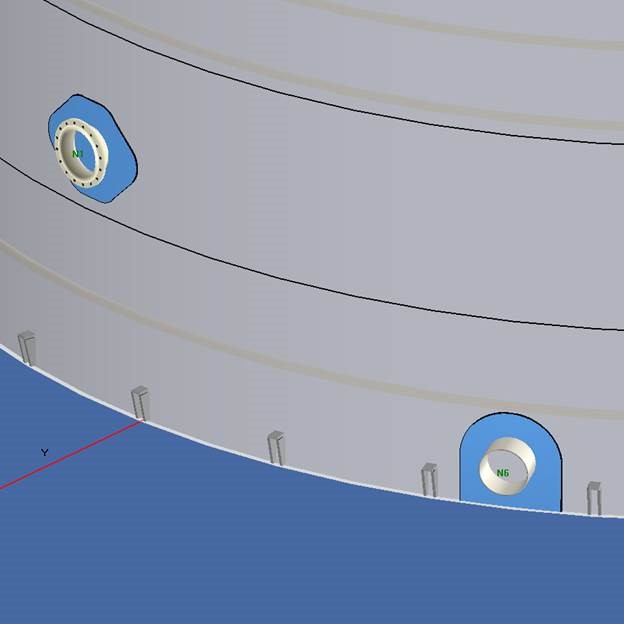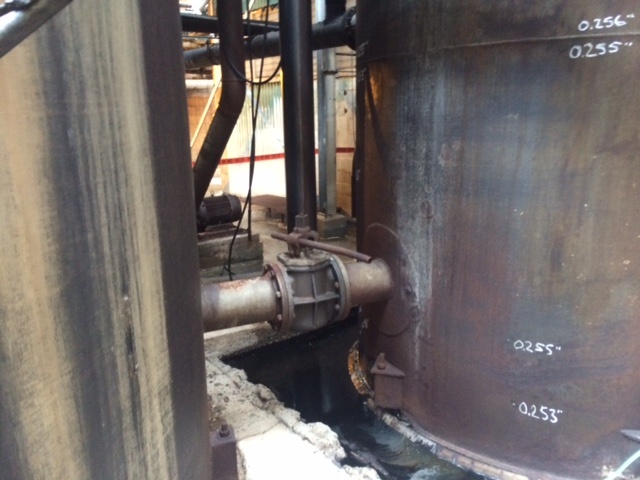The Role of API 650 Welding Inspection in Maintaining Structural Reliability
The Advantages of Welding Inspection for Enhanced Safety And Security and Performance
Welding evaluations are essential for guaranteeing that structures meet stringent sector criteria. They play a vital function in identifying defects early, thus enhancing safety and security and minimizing the danger of disastrous failures. Additionally, these evaluations can result in significant expense financial savings by stopping costly fixings and downtime. As companies intend for improved efficiency and integrity, the relevance of a robust evaluation process can not be overstated. What various other benefits might emerge from a commitment to comprehensive welding assessments?
Making Sure Conformity With Sector Criteria
Guaranteeing compliance with industry standards is essential for keeping quality and security in welding tasks. Sticking to well established procedures not just protects workers but likewise boosts the toughness and efficiency of the final product. Welding examinations conducted at various phases of the procedure help recognize any kind of discrepancies from these criteria, allowing timely restorative actions. This proactive strategy minimizes the danger of failures that could arise from subpar handiwork.
In addition, compliance with industry standards fosters trust among stakeholders, consisting of clients, governing bodies, and the workforce. It symbolizes a dedication to quality and responsible techniques, which can result in increased business opportunities and a competitive side out there - API 650 Welding Inspection. Regular examinations additionally assure that methods and materials used straighten with the latest technological advancements and security laws. Ultimately, adherence to market requirements is not just a governing need however a keystone of quality control in welding projects
Enhancing Security Via Early Discovery of Defects
While the primary objective of welding examinations commonly focuses on conformity, they play a crucial function in improving security by enabling the early discovery of defects. Identifying issues such as incomplete fusion, splits, or porosity throughout evaluations can greatly mitigate the risk of catastrophic failings. Early detection allows for timely interventions, making certain that malfunctioning welds do not endanger architectural integrity.
Furthermore, methodical examinations foster a society of security within organizations by highlighting the significance of quality assurance. This positive technique not just secures workers yet additionally safeguards the surrounding atmosphere. Regular examinations can reveal trends in defect incident, permitting for adjustments in welding techniques and training programs to deal with underlying concerns.
As a result, welding assessments act as a critical safeguard, strengthening general safety and security and performance by identifying defects prior to they intensify right into serious risks. This dedication to top quality straight adds to the longevity and dependability of welded frameworks.
Decreasing Costs by Protecting Against Failings
By carrying out thorough welding assessments, organizations can effectively lower expenses connected with failures and rework. The positive recognition of defects throughout the welding procedure minimizes the risk of tragic failings that can lead to costly repair work or replacements. Early detection permits timely interventions, which protects against the acceleration of small issues into major issues that strain sources and budget plans. Additionally, by ensuring that welds satisfy defined criteria, companies can avoid weblink delays in task timelines triggered by the demand for considerable rework or added assessments later on while doing so. This not just conserves money but likewise improves operational efficiency. A reputation for top quality craftsmanship can lead to increased client fulfillment and repeat company, more contributing to monetary stability. Generally, investing in welding assessments is a tactical strategy that cultivates expense savings while protecting the honesty of bonded structures.
Improving Performance and Durability of Frameworks


Welding evaluations play an essential role in enhancing the performance and longevity of structures, as they confirm that welds are implemented to the highest criteria. By recognizing problems early in the welding process, assessments avoid weaknesses that might jeopardize architectural honesty. This positive method warranties that the materials utilized satisfy needed requirements, consequently optimizing their load-bearing capacity and durability.
Moreover, constant monitoring of welding techniques adds to the total high quality of construction tasks. When welds are verified for conformity with industry requirements, the capacity for tiredness and failure in time is significantly lowered. Structures that are built with effectively inspected welds are most likely to experience less maintenance issues and enhanced sturdiness.
Ultimately, strenuous welding evaluations not only reinforce the instant performance of a structure but also prolong its operational life-span, providing long-lasting worth to both end-users and contractors alike.
Fostering a Society of Top Quality and Dependability
A dedication to top quality and reliability in welding practices greatly adds to the general success of building and construction jobs. They foster a society that motivates precise interest to information and adherence to industry criteria when organizations focus on this contact form these values. This culture not only boosts the skill degree of welders however likewise promotes responsibility and team effort among all stakeholders entailed in the project.

Normal welding evaluations work as a keystone in this social change, reinforcing the significance of consistent efficiency and precaution (API 650 Welding Inspection). By applying rigorous evaluation protocols, business can identify possible imperfections early, mitigating risks and avoiding pricey rework. A focus on top quality and dependability instills confidence amongst clients and companions, leading to stronger relationships and enhanced credibilities.
Partnerships Ultimately, promoting a culture of high quality and dependability in welding techniques not just elevates task end results yet likewise guarantees long-term sustainability and success in the building and construction sector.
Frequently Asked Questions
What Certifications Should a Welding Inspector Have?
A welding inspector must have appropriate qualifications, such as AWS CWI or CSWIP. Furthermore, they must have experience in metallurgy, welding procedures, and examination techniques, in addition to solid analytical abilities and interest to information for reliable assessments.

How Usually Should Welding Inspections Be Conducted?
Welding examinations must be carried out frequently, preferably after each considerable stage of the welding procedure. In addition, routine examinations must take place based on project demands, solution conditions, and regulatory requirements to assure ongoing quality and security.
What Devices Are Made Use Of Throughout Welding Inspections?
Welding examinations make use of numerous devices, consisting of ultrasonic testers, magnetic fragment testers, aesthetic examination devices, and radiographic tools. Each tool serves a particular objective, making certain weld top quality and structural integrity with complete assessment and evaluation.
Can Welding Inspections Be Performed From Another Location?
Welding evaluations can indeed be executed from another location utilizing sophisticated innovations such as drones and specialized video cameras. These tools allow inspectors to examine welding quality and stability from a distance, enhancing effectiveness and safety in various environments.
What Are the Typical Kinds Of Welding Flaws?
Typical sorts of welding issues consist of porosity, cracks, incomplete fusion, damaging, and slag inclusion. These problems can endanger the stability and strength of welds, causing potential failings in structural applications if not attended to effectively.
Welding inspections are essential for making sure that structures satisfy strict industry requirements. you can try these out Welding examinations performed at different stages of the procedure assistance identify any deviations from these criteria, allowing prompt rehabilitative activities. Welding examinations play a crucial role in enhancing the performance and longevity of structures, as they verify that welds are carried out to the highest requirements. Welding examinations ought to be carried out frequently, preferably after each substantial stage of the welding process. API 650 Welding Inspection. Welding inspections use various devices, including ultrasonic testers, magnetic fragment testers, visual assessment devices, and radiographic devices